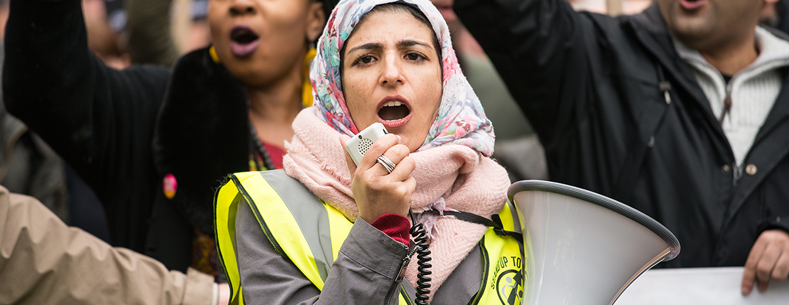Modern human rights laws and standards were borne out of war, and are said to provide a ‘roadmap’ for times of crisis.
The Welsh Government’s core values for healthcare planning and decision-making during the pandemic are clear that “everyone matters”. This means “health service delivery will follow the principles set out in equality and human rights legislation”.
This article provides an high-level overview of how the new legal powers, policies and actions of public authorities affect people’s rights and freedoms in Wales.
We have a separate article on equality issues, and another will be published on children’s rights. We also published an article on the legislation introduced in response to the pandemic, and a post on the emergency social care and mental care provisions.
This article was last updated on 6 May 2020.
Human rights in Wales
The UK is signed up to a range of international human rights treaties. The most important is the European Convention on Human Rights (ECHR), which protects the right to life, liberty, private and family life, the freedom of assembly and freedom of expression, among others.
These rights apply in the UK through the Human Rights Act 1998. The Act requires public authorities (like local authorities, health services and the police) to respect and protect these rights in everything they do. People can challenge breaches of Convention rights in the courts.
Welsh Ministers also cannot act in a way that breaches Convention rights. Any provisions in Welsh law that are incompatible with human rights are invalid.
Balancing the right to life against other rights during the pandemic
The right to life is protected by Article 2 of the ECHR. It places a proactive obligation on governments to take action to protect life, especially for the most vulnerable people.
Measures to protect life have included passing laws that aim to slow the spread of infection by:
- requiring the closure of certain businesses and premises,
- restricting the movement of people without ‘reasonable excuse’, and
- powers to detain ‘potentially infectious’ people.
These measures restrict people’s rights to liberty, private and family life and freedom of assembly. They have been called “the most wide ranging restrictions on civil liberties for at least 75 years”.
Governments are allowed to restrict these rights for a ‘legitimate’ reason (which includes the protection of public health) as long as they are ‘proportionate’ (i.e. they do no more than what is absolutely necessary to achieve the aim).
However, the right to life and the prohibition of torture, inhuman or degrading treatment cannot be restricted.
During the debate on emergency legislation on 24 March, the Minister for Health, Vaughan Gething AM said:
“I recognise the need to balance my duty to protect the public's health against my duty to respect individual rights.”
The UK Government considers that the powers in the Coronavirus Act that restrict some human rights have a “very strong justification”, given the “overriding public health emergency”.
Other proactive measures to protect life could include ensuring that people most exposed to the virus have appropriate personal protective equipment (PPE). This is particularly relevant for older, recently-retired healthcare workers who have returned to the NHS during the pandemic who may be more vulnerable to the virus.
Social care and mental health duties
Some duties on local authorities have been relaxed to help ease the burden of work when their workforces are depleted or if there is a surge in demand during the pandemic.
Social care
Regulations made by Welsh Ministers to bring into force provisions in the emergency UK Coronavirus Act mean that local authorities no longer have a duty to meet adult’s care and support needs, nor adult carers’ support needs. They now only have to meet the needs in the most serious cases where someone is at risk of abuse or neglect.
The equivalent section relating to English local authorities requires them to meet care and support needs to avoid “a breach of the adult’s Convention rights”. The English section was criticised by the British Institute of Human Rights (BIHR) as they consider it unreasonable to expect local authority staff to determine if their actions would breach human rights.
The equivalent English Regulations were accompanied by guidance, an ethical framework (which includes a core principle that “every person and their human rights, personal choices, safety and dignity matters”), and an impact assessment.
The Welsh Government published guidance on the changes to adult social care during the pandemic on 30 April, which include some overarching principles:
- everyone matters – social care delivery will continue to follow the principles set out in equality and human rights legislation
- everyone matters equally – this does not mean that everyone is treated the same, but it does require all sectors to work effectively in partnership with each person, equitably according to their needs
- the interests of each person are the concern of all of us, and of our society
- the harm that may be suffered by any person matters, and so our actions aim to minimise the overall harm that a pandemic might cause
You can read more about the Regulations and the sector’s reaction to them in our blog post.
Mental health
The Welsh Regulations also commence changes which mean that the Mental Health Review Tribunal for Wales no longer has to comply with certain requirements.
This includes allowing cases to be determined without a hearing in certain situations, which could restrict people’s right to a fair hearing (Article 6). These situations include where holding a hearing would result in an undesirable delay, and if enough evidence is already available, and as long as it would not be detrimental to the patient’s health.
The Welsh Government has not (as yet) made any statements regarding why it felt this was necessary, or the evidence base for its decision.
Other provisions in the Coronavirus Act that would relax mental health safeguards have not yet been ‘switched on’ in Wales through Regulations.
The BIHR says that these changes would mean that “people may be released into the community early (without the right support) or find themselves detained for longer than necessary”. This could have implications for the person’s rights to life and liberty. The BIHR suggests that safeguards to protect people’s right to liberty should be maintained, but with streamlined processes.
Detention of potentially infectious people
A person’s right to liberty can be restricted if they are capable of spreading infectious diseases.
Welsh public health regulations give Welsh Minsters, public health officials and police constables the power to detain people who are potentially infected with coronavirus.
The European Court of Human Rights has said that a person can lawfully be detained to prevent the spread of disease when it is clear there is a danger to public health or safety, and where detention is a last resort after less severe measures haven’t worked.
On 20 March, the Council of Europe (which is not an EU institution) set out principles that states should adhere to when detaining people during the pandemic.
Equality and non-discrimination
All rights and freedoms in the Convention must be protected and applied without discrimination (as set out in Article 14).
This means that a young or able-bodied person’s right to life must be protected in the same way as an older or disabled person’s life, for example. The Welsh Government’score values for healthcare planning and decision-making during the pandemic assert that “everyone matters” and that the core value underpinning this ethical framework is “equal concern and respect”.
This issue was thrown into sharp relief by NICE rapid guidelines (which are used by the Welsh NHS) which initially recommended all adults should be assessed on admission to hospital using the Clinical Frailty Scale. This scale is usually used to identify older people who may or may not benefit from critical care by looking at things like how much support people need to live day-to-day.
But campaigners raised concerns that it was not a suitable way of assessing younger people with autism, learning disabilities and conditions such as cerebral palsy, and could result in those groups not getting equal access to critical care. The guidelines were changedafter a proposed judicial review challenge (based on human rights and equality obligations) to make it clear the scale should not be used for younger people with these types of disabilities.
The equality issues outlined in our previous blog post demonstrate that some people are more vulnerable to the virus - and its the social and economic effects - than others. This means that governments have to make sure its approach is flexible to different needs, and that no-one falls between the gaps in care and support.
Other human rights issues
There are a wide range of other human rights issues emerging as a result of the pandemic, including:
- Domestic abuse: as outlined in our previous post, there is evidence that domestic abuse is increasing during the lockdown. This engages obligations to protect life (Article 2), and to protect people from inhuman or degrading treatment (Article 3).
- Education: as outlined in our previous post, some groups of children are more at risk of falling behind while schools are closed. This engages the right to education (Article 2 of Protocol 1).
- Surveillance: the UK Coronavirus Act makes changes to surveillance powers in the interests of ‘national security’. This could restrict the right to privacy (Article 8).
Transparency, scrutiny and review
The Assembly is scrutinising the Welsh Government’s response to coronavirus through emergency plenary meetings, but subject committees are not currently meeting.
Where a state’s actions restrict human rights, transparency and scrutiny are even more important.
The Council of Europe’s guidelines on respecting democracy and human rights during the pandemic emphasise the importance of parliamentary scrutiny:
Parliaments [..] must keep the power to control executive action [..] by verifying, at reasonable intervals, whether the emergency powers of the executive are still justified, or by intervening on an ad hoc basis to modify or annul the decisions of the executive.
The guidelines also note the importance of transparency and public access to official information. This could include publication of scientific and public health evidence upon which governments’ decisions are being made. It says that any restriction of access to information must be exceptional and proportionate to the aim of protecting public health.
The UN’s principles for good governance and human rights also emphasise transparency, responsibility, accountability, participation and responsiveness to the people’s needs.
The Council of Europe’s guidelines also stress that measures that affect human rights should be time limited. The time limits for the various emergency legal powers are outlined in this blog post.
The UK Parliament’s Joint Select Committee on Human Rights has launched an inquiry into the human rights implications of coronavirus. The House of Commons Women and Equalities Committee has also launched an inquiry on the impact on the protected characteristics under the Equality Act 2010.
Derogation
It is possible for states to ‘derogate’ (which means opt out) from some human rights obligations under the Convention “in time of war or other public emergency threatening the life of the nation”.
The UK has not notified the Council of Europe that it intends to derogate from any part of the Convention during the pandemic. But some countries have done so, including Latvia, Armenia, Estonia, Moldova, and Romania, to some criticism.
Article by Hannah Johnson, Senedd Research, National Assembly for Wales
We’ve published a range of material on the coronavirus pandemic, including a post setting out the help and guidance available for people in Wales and a timeline of Welsh and UK governments’ response.
You can see all our coronavirus-related publications by clicking here. All are updated regularly.






